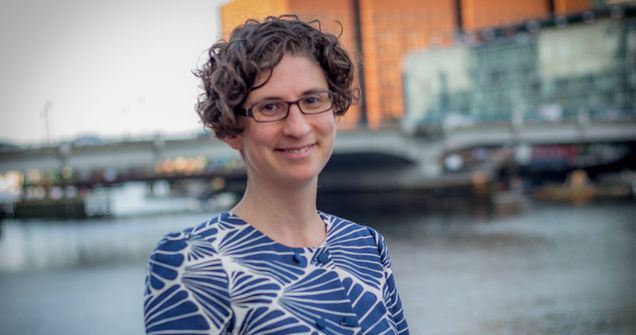BU Alum Rebecca Herst Earns Leadership Award

Meet BU Alum Rebecca Herst
In Spring 2020, BU alumna Rebecca Herst (Questrom ’14) was honored with the Roy J. Zuckerberg Endowed Leadership Prize, which comes with $100,000. Rebecca works as the Director of the Sustainable Solutions Lab (SSL) at the University of Massachusetts Boston. The award is designed to reward leaders of courage, conviction, and selflessness who have devoted their time and talent to helping the University of Massachusetts to accomplish its goals.
Each year Rebecca will receive $30,000 to support her research and service with SSL and a $20,000 award stipend. Rebecca is planning to use the funds to build connections beyond Massachusetts and support the development of a national climate justice research agenda. Read the Boston Globe coverage of this award.
We interviewed Rebecca to learn more about her path and her plans.
Interview
How did your experiences at BU help set you on the path for the work you are doing now?
When I started the Social Impact MBA at the Questrom School of Business at BU I wasn’t planning on doing anything related to climate change or the environment at all. Then, in the second year of my MBA, I took a class called “Leading Sustainable Enterprises” with Ken Pucker and I took “Management Consulting” with Kristin McCormack. Ken laid out in stark terms the impacts of the climate crisis and made an incredibly compelling case to work on issues of climate change in our careers. My client in Kristin’s class was the City of Boston for a project that attempted to make the business case for small business owners to become more resilient to the impacts of climate change.
I was coming from a community organizing background and was interested in working for racial and economic justice in my career. I quickly realized that big corporations had the capacity to prepare for the long-term impacts of climate change in a way that black and brown communities did not. I could also see clearly that these communities that had the least capacity to prepare were getting hit the hardest by climate impacts and that climate change was amplifying and accelerating inequity.
Between these two classes I found the field of climate adaptation. I was really excited to find a field focused on the impacts of climate change on people and cities. I knew this was the work I wanted to do. One of the reasons people go to graduate school is to be exposed to new ideas and new fields and that was definitely my experience with the Social Impact MBA. After zeroing in on this field, Kristin helped me find an incredible internship with a BU alumna, Sarah Barnat, at the Urban Land Institute that was a real launch pad for my career.
Who at BU played a particularly influential role in your life?
Once I figured out that I wanted to do sustainability work, I had the pleasure of working with Dennis Carlberg on a sustainability committee on campus. He was then a huge advocate for me. I got to work with him at the Urban Land Institute and then he helped me get my next job in the Harvard Office for Sustainability. There is no way I would be where I am now if it weren’t for my experiences at BU and, in particular, the support of Ken, Kristin and Dennis.
Tell us about your goals and how this funding will help you advance them.
We know (and are seeing very clearly with COVID-19) that because of structural racism, black and brown communities are hit hardest by disasters. This is true whether they are public health, economic or climate disasters. What we don’t know as well is how our attempts to prepare for and respond to disasters amplify inequities and what best practices are to address these challenges instead of making them worse. My plan is to use the Zuckerberg prize money to pull together climate justice researchers and leaders on the front lines to develop a research agenda. Together, we can clarify some key questions that will help us ensure that our climate adaptation efforts and investments advance equity and racial justice.
My plan is to use the Zuckerberg prize money to pull together climate justice researchers and leaders on the front lines to develop a research agenda.